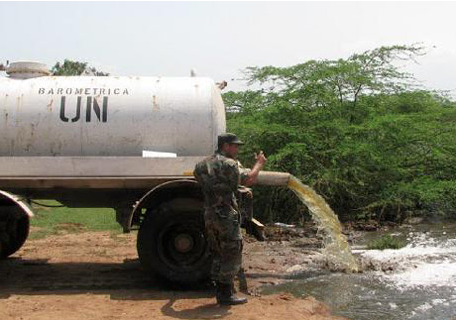 By RICK GLADSTONE NY Times
By RICK GLADSTONE NY Times
A legal battle by the Haitian victims of a cholera epidemic against the United Nations reached its highest level in an American court on Tuesday, as lawyers for the plaintiffs were permitted to argue before a federal appeals panel why they believe the United Nations is not entitled to immunity.
Based on the questions asked by the three judges hearing the arguments in a packed Manhattan federal courtroom, they appeared sympathetic to the victims.
The outcome of the case, in which United Nations peacekeepers are accused of having negligently brought cholera to Haiti after their deployment in 2010 following a disastrous earthquake, could have enormous implications for the United Nations. The global organization has asserted that a 1946 convention on privileges and immunities insulates it from such legal action — a defense that the appellate judges are now weighing.
Their decision is expected in the next several months, and if they agree with the cholera victims the case could be returned to a lower court for trial. If the judges deny the appeal, lawyers for the victims said, they would seek to bring the issue before the United States Supreme Court.
“Immunity does not mean impunity,” Beatrice Lindstrom, a lawyer for the Institute for Justice and Democracy in Haiti, a legal advocacy group that is helping represent the cholera victims, told the appellate judges.
There is little dispute that the peacekeepers were at fault, as supported by medical studies including some of the United Nations’ own findings, but the organization has declined to even acknowledge it is a defendant in the lawsuit, one of at least three that has been filed in the United States.
The cholera epidemic has killed more than 9,000 people in Haiti and infected more than 800,000.
The case was dismissed by a lower-court judge in 2014 after Justice Department lawyers, acting on behalf of the United Nations because the United States is the organization’s host country, argued that under the 1946 convention, American courts had no standing to hear the grievances.
Lawyers for the victims appealed, and in what they described as a last-minute decision announced last Thursday, the United States Court of Appeals for the Second Circuit scheduled a hearing for them to argue their side.
Ms. Lindstrom said the 1946 convention also required the United Nations to compensate people hurt by its activities through the establishment of a special board to evaluate and act on grievances brought by victims, which the organization has not done in Haiti. Based on that lapse, she argued, the United Nations had forfeited any claim to immunity.
“The U.N.’s position is that nothing can compel it to comply with its undeniable legal obligations,” she said.
Ellen Blain, an assistant United States attorney who argued for dismissing the case, told the appellate judges that the Haiti epidemic was an unfortunate disaster but that the immunity provision of the convention, which both the United States and Haiti signed, left no room for interpretation and must be enforced.
Lawyers for the United Nations did not attend the hearing, in keeping with the organization’s position that it is not answerable to the court’s activities. Farhan Haq, a spokesman for the United Nations, said in an emailed statement that “as is the normal course, representatives of the Host State appeared and asserted the absolute immunity of the United Nations.”
The judges asked what other possible recourse the Haitians could pursue, indicating they may see some legal justification for siding with victims caught in a situation in which nobody has been held accountable.
“We are very heartened by today’s proceeding,” Brian Concannon, the executive director of Institute for Justice and Democracy in Haiti, told reporters after the hearing concluded. “I’m not going to predict the proceeding but it was heartening to see the judges asking very good questions.”
Mario Joseph, a Haitian lawyer who is the lead counsel for the cholera victims, said after the hearing that he believed “the United Nations is walking toward the end of this absolute immunity.”
